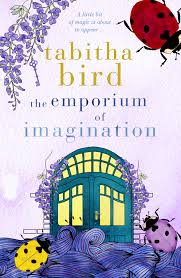We could all do with a little more magic in our lives, and whether you are eight or 108, The Emporium of Imagination (Penguin Random House 2021) by Tabitha Bird will calm, enlighten, inspire, thrill, rescue, ignite and magic you into another realm of possibilities.
Tab’s debut novel, A Lifetime of Impossible Dreams, won the hearts of readers with its gentle and subtle treatment of childhood trauma infused with the wonder of imagination. This second novel is no less wonderful and will treat readers to more of the same.
Set in the author’s home town of Boonah in rural Queensland, this is the tale of The Emporium, a magical shop that appears in various places, where and when it is most needed. It has a custodian, Earlatidge Hubert Umbray, and an enchanted cat. It builds itself overnight, brick by brick, and fills itself with all manner of exciting and fascinating paraphernalia. Flowering vines wind around its windows, and inside the shop, the ‘carpet’ is lush green grass full of wildflowers and colourful ladybugs that turn into lollipops. The shop is full of vintage, retro and antique wares. Suitcases and trunks are bursting with items labelled Looking Glasses, Open Me Last, Hopeful Things to Eat, Walk in My Shoes and Toys of Yesteryear. It’s an Alice in Wonderland vibe. And it must be opened by the new shopkeeper – Earlatidge is never sure who it will be, but it will be someone local and they will have the key – and then fantastical invitations will begin to appear in people’s pockets, inviting them to visit the Emporium, to find whatever it is they need, whatever they have lost … be that comfort or joy, reconnection with a loved one, memories revisited, or the chance to make amends. It is a charmed and mysterious place that enchants everyone who enters.
There are a few key characters who are prominent (although the story encompasses most of the townsfolk in Boonah; rarely is there somebody unaffected one way or another.) One of these is 10-year-old Enoch, who lives with his brothers and his grandmother, all weighed down with recent grief, and Enoch especially by a guilty secret. Another is Ann, who has come to Boonah to be close to her own grandmother in her dying days, but who can’t stop thinking about Enoch’s father. And of course there is Earlatidge himself: his time as custodian is coming to an end, but before that happens, he must reckon with his own tragic past and his own lost regrets.
Throughout the story floats another book (a story within a story), The Owner’s Guide to Grieving. This appears to the people who need it most and stays with them even when they try to throw it away. Eventually, people begin to write in it, like a journal … short pieces about their own grief, and then their reactions to the words written by others. In this way, the book becomes a powerful source of connection for the entire community, as neighbours and friends recognise each other’s pain, loss, grief and discomfort. It becomes a tool of encouragement too, for cheering on those willing to take a risk, to try something new, to accept the challenge of change before it is too late.
The grieving book, the people, the township, the community, the tsunami, the past, the treasures, the community … all come together in one heartbreaking and beautiful storm. Perhaps some of the most vital and cherished objects in the Emporium are the phones – all manner of telephones, from old, black Bakelite rotary phones to modern iPhones. These phones allow visitors to the shop to contact their lost loved ones, a process that – as you can imagine – creates all sorts of tears and joy. Contacting those gone, and repairing broken dreams, are the two most important roles of the shop.
But when the Emporium itself begins to fall apart, (perhaps it is even dying?), is when Earlatidge realises he must face his own demons and do for himself what for so long he has been doing for others.
The Emporium of Imagination is written in Tabitha Bird’s trademark style. As with her first book, she explores the themes of grief, loss and trauma, particularly childhood trauma. But she does so with a lightness of touch, an optimism, a splash of magic and hope, that counters any heaviness with light. Grandmothers feature strongly in both stories, and those who know Tab will know why. Her respect and fondness for the elderly, and her desire to protect and comfort young children, play out in her stories in different ways, but always with the same feel of a warm, enveloping hug.
The chapters are written on a countdown… starting with ’21 Days Left’, leading us to wonder what will happen when those 21 days run out. This keeps pulling the reader forward to the next page, and the next. And the whole content is so absolutely full of imaginative and outlandish objects and ideas, it transports the reader to another time and place, a time of wonder and impossibility made possible, of dreams come true and wounds healed, of spirits restored and hopes ignited. A time of childish optimism and fantasy. This story is a comfort, a joy and a balm. A much needed piece of magic in a world that could do with more of it.

